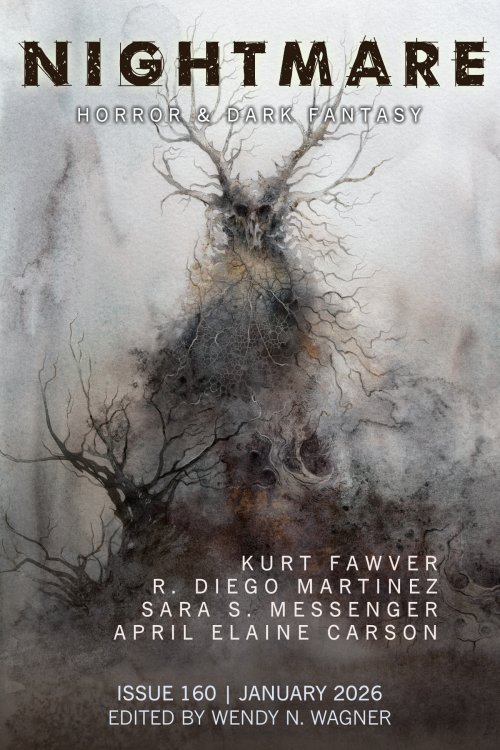I. My Father, My Wolf Man
The first horror film I ever saw was with my father. I was way too young to watch anything so graphic, and I cowered behind the ratty green footstool in the living room, daring to peek out when the worst was over. The lights were off, curtains drawn, blinds closed, and my father lay on the couch, very disinterested in my sheer terror. But by that time, I’d already learned not to make a fuss. Be still and quiet so you don’t get noticed. Otherwise bad things happened.
I don’t remember the film. It was some low-budget werewolf flick that today I would have a big laugh about with my friends over margaritas. Back then it was the scariest thing I had ever seen on the screen, though I was already intimately familiar with fear once the TV turned off. It’s surreal watching a monster movie with your personal monster at an arm’s length, unbothered by the carnage or its effect on you. Like the werewolf, my father took pleasure in exerting violence. Only my werewolf didn’t turn under the full moon, but by the second glass of whatever cheap alcohol he got his hands on. It’s a lot less predictable than following the lunar calendar. I would listen to his footsteps whenever he returned from work to guess whether he’d be a man or a monster that day. It’s surprising how quickly a person can learn to pick up the sound of footfalls from a great distance—through the door, across the yard, by the garage door.
Based on that first brush with the horror genre, I shouldn’t have become a fan, but I’ve come to learn it’s normal for people with complex trauma to return to the scene of the crime. Face it again. Maybe learn how to deal with it this time around. I had an immediate kinship with the protagonists in horror films. I knew what it was to be prey and have your every single action predicated by what the monster does. Anticipation, reaction, and mitigation are your only available choices.
More importantly, horror films ended.
My horrors didn’t.
II. My Father, My Freddy Krueger
As a child I had a lot of nightmares. I still do, but when you’re young and your waking life is so relentlessly cruel, it’s like your soul catches a fever that you have to sweat out in whimpers at night. A lot of those early nightmares were about my father. I couldn’t catch a break from him even when unconscious. Night was the best time for me (even though it terrified me), because I slept with my grandparents, and I didn’t have to pretend everything was fine.
The nightmares got so bad that one afternoon my grandmother invited over a wise woman to “pour a bullet” and divine what caused them. Pouring a bullet involves melting a piece of lead in a metal bowl and having the patient lie down in bed with their face covered by a cloth. The wise woman hovers the bowl with the molten lead over their feet then up a straight line over their belly, their heart, and their face, and while over their face, pour the lead into a bowl of cold water. The lead then hisses and clumps into a shape, which the woman will interpret. My bullet took the form of a big, tall man hunched over.
They asked me, “Who is the man that’s making you so afraid?”
I couldn’t answer. I just shrugged. Things would not change in any way. I must have been around ten or so by then, and I’d lost a lot of hope.
In high school, once we got the internet, I discovered the Nightmare on Elm Street films and fell in love instantly, though they didn’t scare me. Freddy had so much personality. Made each nightmare creative and purposeful. He was preferable to my monster. Unlike Freddy, my father had no charm, and all his cruelty felt impersonal. A force of habit to find release, because he was so deeply unhappy with himself, which I think is the worst of all. Nothing I did would have mattered in changing the outcome. I’d always be collateral damage for whatever was going on inside his soul.
I greatly bonded with Nancy Thompson, who had to face Freddy for what seemed like forever; her sanity being chipped away along the way to her death. I often felt like I was going to go insane as a child. That by the time I’d grow old enough to leave I’d have been sliced to nothing. Years later, after a serious mental breakdown, I was diagnosed with trauma-caused bipolar disorder, so I guess I did go insane in the end. It only took twenty years to catch up to me.
But before I learned my diagnosis and found ways to regulate my nervous system, there were horror films I discovered online, which taught me how to feel things. The music told me what to feel and when to feel it, when in real life all I felt was anxious and afraid most of the time. The films would hook two fingers through my ribcage and pull me up when they ramped up for the big scare, shake me to my core and then lower me after it was over. Then I’d know from the music and the lighting that I had some time for safety and calm. Those were the moments when I’d have a chance to relax my muscles. The endings were sweetest, because the evil was over.
The first time I thought it might be over for me was when my parents divorced. I had been freshly accepted into university and it felt like a fresh start. I thought I had left my nightmare demon behind and I might sleep again, but what’s a good horror film without its sequel?
Shortly after the divorce was finalized, my father told me that he’d find me wherever I was and run me down with his truck. My dad is a truck driver. He’s driven it all—bread delivery trucks, construction material trucks, long-haul trucks through Europe, garbage trucks—and he used to stalk my mother in town to make sure she kept in line. What “kept in line” meant was not talking to any man, even if it was a coworker. He had done this consistently, so I never doubted he’d run me over. It was just a normal thing to expect from him. For the better part of three weeks, I waited for the bus halfway between my house and the bus stop, standing between two trees so that if he did try, I’d have cover to take the impact.
He didn’t, though I almost wish he had, because then I wouldn’t have to worry every time I saw a truck drive down our street.
III. My Father, My Ghostface
It was the night after my grandfather’s funeral. We’d come home after freezing in the cemetery, and I put on a film on my laptop to distract my sister from the grief of losing the closest person we had to an actual father. Then my mother’s phone started ringing.
It was him. This was years after the divorce. I’d graduated, moved cities, had practically cut contact with him, although not definitively to his face. He attended the funeral (uninvited) but remained respectful and hung back. I almost thought he would be a person for once.
Over the phone, he demanded my mother meet him outside, because he loved her and they had to be together. He had been drinking. We could all hear the alcohol on his breath when he yelled at my mother. She hung up, he rang again. She turned off her phone. Much like Ghostface, my dad terrorized us with the constant ring-ring-ring of the landline, itself shrill and threatening. Then we unhooked the landline after he rang again and again and again. Then it was my turn. Then it was my sister’s, who was sobbing next to me. I don’t remember what I told him back then. I must have pleaded with him to leave us in peace. What I do remember is him ordering me to “bring your mother outside so I can beat her in front of you and show her her place.”
We switched off all phones and it was not enough. He banged on the windows of our house, yelling “Diana! Diana!” I should have been used to terror like this by then, but I felt like dying. Cornered us at home and stalked the windows in the dark. Made threats. His threats were the only promises he was keen to keep.
I come back to the Scream films regularly. Watch and learn. Coach myself on the mistakes of others turned deadly, hoping they’d somehow find a way to survive this time. It’s what some victims of childhood abuse do with their trauma. I certainly do. I rewind my life back to the worst moments, see things from a new angle, imagine how things would turn out differently had I reacted in some other way. Had I been brave enough, maybe it wouldn’t hurt as much. By that night I’d thought I’d done this enough to make me something other than a victim. I was an adult, but that night I shrunk back to being a child. He eventually went away, and I still feel like a coward for not chasing him away myself. These days I rewind to that night and write different story beats. Make different decisions. Create alternative narratives, but that doesn’t change the past.
He’s still out there. There’s always the promise of a return. They always do, don’t they? No matter how many times Sydney Prescott survives, bloodied and scarred, you can count on that damn phone to start ringing again. But you can always count on Sydney to make it to the end and survive this latest iteration of Ghostface. It’s all we can realistically be expected to do.
“What’s your favorite scary movie?” This question is a trap in the Scream movies, but it’s liberation for me.
“All of them,” I answer. “I have lived through them all. They are my home.”








